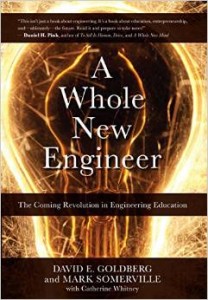Podcast: Play in new window | Download
Subscribe: Apple Podcasts | RSS
 In a lively discussion of how to best prepare today’s engineering students for tomorrow’s engineering challenges, we talk with Dave Goldberg and Catherine Whitney about their new book, A Whole New Engineer.
In a lively discussion of how to best prepare today’s engineering students for tomorrow’s engineering challenges, we talk with Dave Goldberg and Catherine Whitney about their new book, A Whole New Engineer.
- Any “dot-com” dreams that Brian harbored during his college days have long since dissipated.
- Carmen suggests that ridiculous buyout amounts are now measured in units of “Instagrams,” with one Instagram equaling one billion US dollars.
- Engineers must constantly expand and refine their skills; Jeff notes that over his career he has moved from drawing prints on a drafting board, to working with 2D CAD packages, to implementing 3D models.
- Our first guest for this episode is Dave Goldberg, who appeared previously on Episode 37, in which he talked with us about the evolution of engineering roles over time. Dave leads ThreeJoy Associates, a consulting firm that advises educational institutions.
- Our second guest is Catherine Whitney, a New York-based writer who has previously written or co-written more than forty books on a wide range of topics, including nutrition, social issues, and entrepreneurial success.
- Dave argues that the “old engineer” was entirely appropriate in a time of expertise and narrow technical focus. However, a “new engineer” must reach across disciplinary boundaries, and solve problems in domains that lack recognized experts.
- Domenico Grasso has written about the importance of taking a holistic approach to engineering education and practice.
- Catherine mentions the myth of the “lone genius.”
- Dave makes a passing reference to disruptive innovation, a term coined by Clayton Christensen to describe the manner in which existing markets and institutions may be displaced through the introduction of new technologies.
- Current technological trends have led to people “bowling alone,” a phrase the describes how individuals are disengaging from the social and political networks that comprise local communities.
- Richard Feynman’s physics lectures are mentioned by Dave.
- The story of Jack Andraka is offered as an example of how academic expertise is being undermined over time.
- Jeff notes differences between “just-in-time” and “just-in-case” learning.
- Dave notes that more than one version of the Grinter Report (pdf) was proposed back in the mid-1950s.
- Our guests mention a study by Kristen Wolfe, later referenced by Woodie Flowers of MIT, that looked at the skills used by mechanical engineers five years after they graduated from college.
- Carmen references one of his favorite books, The Art and Science of Analog Circuit Design, by Jim Williams.
- An engineering leadership program at the University of Texas El-Paso is cited by Dave as an example of aspiration-specific education.
- Fernando Flores has written about the power of words in motivating action and establishing commitments.
- Dave was involved in establishing iFoundry at the University of Illinois, while co-author Mark Somerville was (and is) a faculty member at Olin College.
- References are made to Daniel Pink’s book Drive, and to Edward Deci’s work on intrinsic motivation (one example of which is his book Why We Do What We Do: Understanding Self-Motivation.
- A TED talk by Sugata Mitra describes how Indian children were able to teach themselves when provided nothing more than a computer.
- Harvard University’s Eric Mazur has championed the concept of peer instruction, in which college students teach one another.
- Dave introduces us to the concept of Junior Enterprise, a student-led consulting firm.
- In the coaching world, there exists the notion of polarity management, in which distinctions are made between problems and unsolvable paradoxes.
- Big Beacon is a social movement for transforming engineering education.
- More information about the book can be found at wholenewengineer.org.
- Catherine can be reached via email: catherinewhitney -=+ at +=- mac.com.
- Listeners can contact Dave via email: deg -=+ at +=- bigbeacon.org. He is also active on Twitter and Facebook.
- Finally, one can follow the happenings at Big Beacon via their website, on Twitter, or on Facebook.
Thanks to Dave Goldberg and Mark Somerville for use of their book cover image. Podcast theme music by Paul Stevenson.